Social recovery therapy in combination with early intervention services for enhancement of social recovery in patients with first-episode psychosis (SUPEREDEN3): A single-blind, randomised controlled trial
Full Article David Fowler, Jo Hodgekins, Paul French, Max Marshall, Nick Freemantle, Paul McCrone, Linda Everard, Anna Lavis, Peter Jones, Tim Amos, Swaran Singh, Vimal Sharma, and Max Birchwood Abstract Background Provision of early intervention services has increased the rate of social recovery in patients with first-episode psychosis; however, many individuals have continuing severe and persistent problems with social functioning. We aimed to assess the efficacy of early intervention services augmented with social recovery...
Lived experiences of negative symptoms in first‐episode psychosis: A qualitative secondary analysis
Full Article Brioney Gee, Joanne Hodgekins, Anna Lavis, Caitlin Notley, Max Birchwood, Linda Everard, Nick Freemantle, Peter B. Jones, Swaran P. Singh, Tim Amos, Max Marshall, Vimal Sharma, Jo Smith, and David Fowler Aim Exploring how negative symptoms are experienced and understood by individuals with lived experience of psychosis has the potential to offer insights into the complex psychosocial processes underlying negative symptom presentations. The aim of the current study was to investigate...
The course of negative symptom in first episode psychosis and the relationship with social recovery
Full Article Brioney Gee, Jo Hodgekins, David Fowler, Max Marshall, Linda Everard, Helen Lester, Peter B. Jones, Tim Amos, Swaran P. Singh, Vimal Sharma, Nick Freemantle, and Max Birchwood Abstract Aims To investigate trajectories of negative symptoms during the first 12 months of treatment for first episode psychosis (FEP), their predictors and relationship to social recovery. Method 1006 participants were followed up for 12 months following acceptance into Early Intervention in Psychosis services. Negative symptom trajectories...
Comparing time use in individuals at different stages of psychosis and a non-clinical comparison group
Full Article Abstract Social functioning difficulties are a common and disabling feature of psychosis and have also been identified in the prodromal phase. However, debate exists about how such difficulties should be defined and measured. Time spent in structured activity has previously been linked to increased psychological wellbeing in non-clinical samples and may provide a useful way of assessing social functioning in clinical settings. The current study compared hours in structured activity, assessed...
Evaluating an early intervention in psychosis service for ‘high‐risk’ adolescents: Symptomatic and social recovery outcomes
Full Article Rebecca Lower, Jonathan Wilson, Evelina Medin, Emma Corlett, Ruth Turner, Karen Wheeler, and David Fowler Abstract Aim This study presents client characteristics and treatment outcomes for a group of young people seen by Central Norfolk Early Intervention Team (CNEIT). The team offers an intensive outreach model of treatment to young people with complex co‐morbid emotional, behavioural and social problems, as well as the presence of psychotic symptoms. Methods Outcomes include both client self‐report and...
Investigating trajectories of social recovery in individuals with first-episode psychosis: A latent class growth analysis
Full Article Abstract Background Social disability is a hallmark of severe mental illness yet individual differences and factors predicting outcome are largely unknown. Aim To explore trajectories and predictors of social recovery following a first episode of psychosis (FEP). Method A sample of 764 individuals with FEP were assessed on entry into early intervention in psychosis (EIP) services and followed up over 12 months. Social recovery profiles were examined using latent class growth analysis. Results Three types of social...
CBT to address and prevent social disability in early and emerging psychosis
Full Article David Fowler, Paul French, Jo Hodgekins, Rebecca Lower, Ruth Turner, Simon Burton, and Jon Wilson Summary This chapter contains sections titled: The Problem Specific Characteristics of a Multisystemic Cognitive Behavioural Approach: The Need to Weave in Systemic and Assertive Case Management Practice in Delivering CBT to Promote Social Recovery Research Evidence Future and Ongoing Trials Time Use as the Primary Outcome A Cognitive Behavioural Model of Social Disability in Psychosis as...
Social and symptomatic outcomes of first‐episode bipolar psychoses in an early intervention service
Full Article Iain Macmillan, Lawrence Howells, Kedar Kale, Corinna Hackmann, Gavin Taylor, Katherine Hill, Steve Bradford, and David Fowler Abstract Aim: We aimed to establish the relative proportions of all diagnoses in people aged 14–35 years presenting to an early intervention in psychosis service, and to compare demographic variables, symptoms and outcomes between the bipolar psychoses and other psychoses at 3–6 months and 1 year post referral. Methods: Prospective 3‐ to 6‐month diagnostic and...
